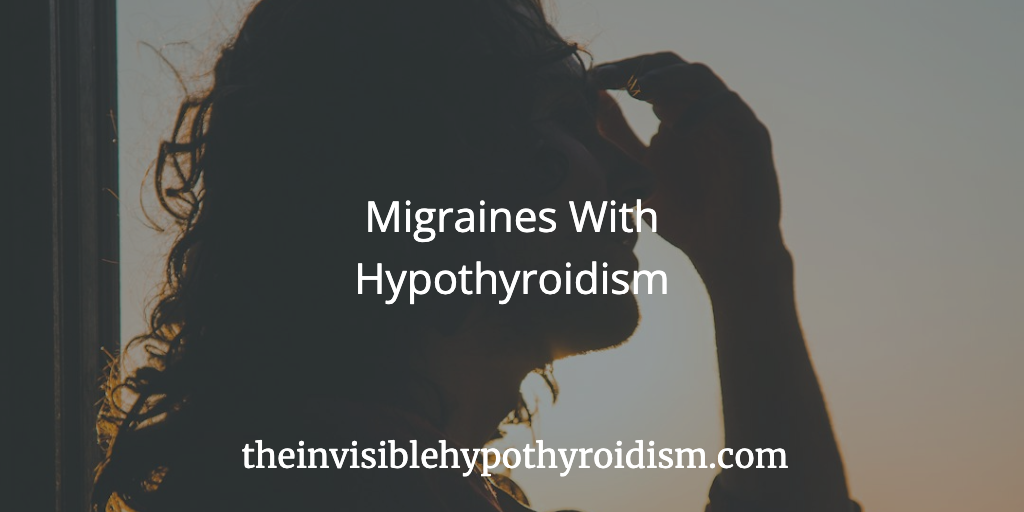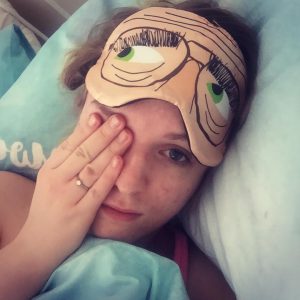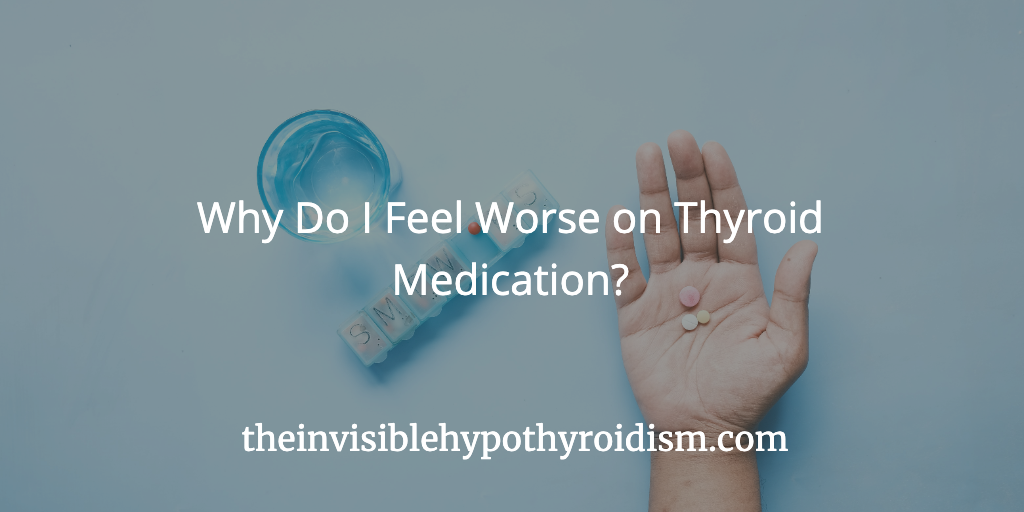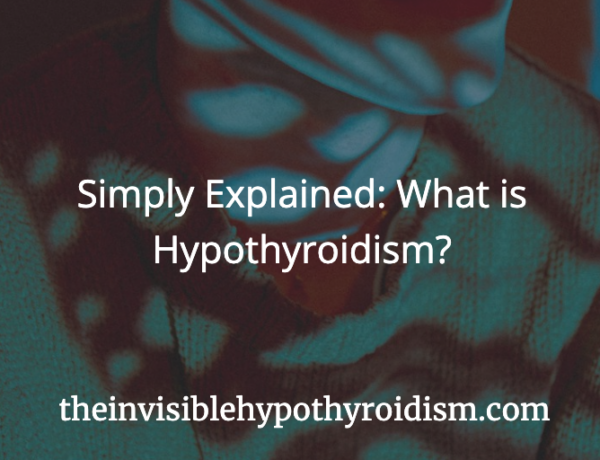Originally published on 5th June 2018 Last updated on 5th August 2024
I hear from many thyroid patients who also experience migraines. Some frequent, some every now and then.
But what’s the link?
What a Migraine Feels Like For Me
Today is the third day in a row that I’ve had a migraine, but the only one that’s not been helped by my regular medication for them. I used to get migraines this often about four years ago, until I came off the combined contraceptive pill and started avoiding caffeinated drinks such as tea.
This double targeted approach meant that my migraines reduced to just one a month, which coincided with the first or second day of my period. Even these started to become less and less frequent as my thyroid levels, sex hormones and other parts of my confused body started to iron out, but lately, I’ve had a sharp increase in them again and I’m unsure as to why.
This eye mask is an interesting addition to my migraine routine, though. Just look at it!
My routine when a migraine attack occurs: I take Sumatriptan (my prescribed migraine meds), drink water, lie in a cool, quiet room and make it as dark as possible with an eye mask. If the pain is at its worse, I also need a hot water bottle on the side the pain is (it’s always behind one eye for me) and a bucket for the nausea in case I’m sick.
I don’t get the ‘aura’ that many others get with my migraines, but do get the horrendous pain (I can’t compare anything else to it), nausea (I’ve been physically sick with migraines in the past too), dizziness and spinning room. I then just have to wait it out and after, I’m left with the ‘migraine hangover’ for a day or so afterwards.
The above paragraph is a post I wrote and put on my social media pages in 2017, which received a lot more responses than I expected. I heard back from other thyroid patients all over the globe, of all ages, who shared their similar experiences with migraines and thyroid disease.
Like me, some stated that avoiding caffeine and coming off hormonal contraceptives helped them stop or lessen the frequency of the attacks, but for others, they also shared that they had great success trying other routes. Going gluten-free, dairy-free, avoiding alcohol such as wine, getting a daith piercing, addressing high blood pressure, treating nasal polyps, taking magnesium supplements and even getting their bowels moving more regularly, were all also stated in helping thyroid patients with their migraines.
But are there any known links in all of this? Whilst some specific substances or issues are known to be connected to migraines, i.e. caffeine and oestrogen, what is the connection? And what can we do to help ourselves?
Let’s Start With What a Migraine is…
A migraine is more than a regular headache. Migraines are debilitating and are not usually helped by regular painkillers such as paracetamol or ibuprofen. The pain often felt behind one eye or on one side of the head is a deep, distracting piercing feeling that is often accompanied by nausea, disturbed vision, sensitivity to light, sound and movement. Some people also feel dizzy and faint with a migraine.
Migraines are often thought to be caused by the expansion of blood vessels in the head, which is how medication such as Sumatriptan (what I’m prescribed) works. They narrow the blood vessels in the head, stopping pain signals being sent to the brain, and blocking the release of certain natural substances that cause pain, nausea, lack of appetite and other symptoms of migraine.
For many, these medications are a lifesaver so that they’re not completely disabled by an attack and can carry on their day as normally as possible. However, for some, these medications don’t work, suggesting that the cause for migraines aren’t completely understood yet or the same for each person.
Pain induced by a migraine can last anywhere from hours to days. A ‘migraine hangover’ is also a term you may have heard, for the fuzzy, unwell feeling that many people experience for a day or so after a migraine attack. It can cause a lack in ability to concentrate, sensitivity to light, sound and mood swings.
The Thyroid Migraine Link
A study published in Headache: The Journal of Head and Face Pain, suggests a connection between thyroid disease and migraines. It included over 8,400 participants, observed over twenty years, and the data collected from the study suggests that those with a pre-existing headache disorder such as migraine, have a 21% greater risk of developing hypothyroidism. Also very interestingly, those already experiencing migraines are a whopping 41% more likely to become hypothyroid! [1]
Hypothyroid patients frequently have a history of migraine issues during childhood, prior to developing hypothyroidism. So this may be an indicator of a predisposition to developing hypothyroidism and a warning of the condition to come.
A study in The Journal of Headache and Pain also found that hypothyroidism was more common in those with migraines than in the general population, suggesting a plausible link between these two health problems. [2]
One possible theory we can pose is that low thyroid hormones lead to a slowed metabolism which can cause the body to retain fluid and mucin glycoprotein. I have an article about fluid retention here. The retaining of fluid and mucin glycoprotein can cause the swelling of blood vessels which commonly lead to a migraine (as already explained above). After all, this is how a lot of prescription migraine medications work, by narrowing the blood vessels again. This would suggest further reasoning as to why below optimal thyroid levels and hypothyroidism can lead to migraines, through the slowing down of the metabolism.
For many thyroid patients, simply getting their thyroid levels optimal may well help in the frequency of migraines, as it does help to improve a lot of symptoms of hypothyroidism, or remove them altogether, so this shouldn’t be overlooked.
However, if your thyroid levels are already optimal and you’re still experiencing migraines, it’d be worth exploring other possible triggers or causes such as those below.
1. Borderline Hypothyroidism
A study recently published in Cephalalgia also suggests that subclinical/borderline hypothyroidism is associated with an increased risk for migraines, too. [3]
So if your doctor is telling you that you’re ‘only borderline’, you may want to push for treatment. More on that here.
2. “Oestrogen Dominance”
The link between hypothyroidism and oestrogen is well understood, as is the use of hormonal contraceptives and migraines. The NHS website even lists the contraceptive pill as a known cause for migraines. [4]
I’m one such thyroid patient who, after years on the combined contraceptive pill, with period issues such as menorrhagia and irregularity as well as my thyroid issues, was told that I had “oestrogen dominance”; where the balance of oestrogen to progesterone is very ‘off’, and this is often worsened when taking hormonal contraceptives.
Oestrogen dominance is often debated as to whether it really exists, and I haven’t full made my mind up yet, just because we are definitely lacking enough evidence, but also, I did respond well to treatment protocols for it.
The link between oestrogen and hypothyroidism is hard to miss, considering that for every nine or ten women that suffer from hypothyroidism, only one man does. We also know that big hormonal shifts in a woman’s body, such as pregnancy or the menopause, can bring hypothyroidism to surface.
The biggest improvement I made for my migraines was in coming off the contraceptive pill, which my GP wanted me to do immediately, aware that there is a big link between hormonal contraceptives and migraines. When I did this, my migraines went from 3 or 4 a week to just one or two a month, which occurred in the first few days of my period.
Going back to the patient I mentioned at the beginning of this article, who said that getting their bowels moving more regularly helped to rid them of their migraines, I would think that this could be linked to oestrogen also. Getting your bowels moving regularly apparently helps to eliminate excess / old oestrogen from the body and one of the key things I have had to work on in fixing the oestrogen dominance was constipation. However, like I say, we don’t have enough evidence on this yet to know for sure.
3. Blood Sugar
Blood sugar imbalances are common in those of us with autoimmune hypothyroidism and as listed on the NHS website, low blood sugar can indeed be a trigger for migraines too! [4]
I never used to realise the importance of making sure that I wasn’t eating sugar or carb heavy meals without adequate protein, and this no doubt made my overall health worse, but my blood sugar was all over the place.
Learning to control your blood sugar is pretty easy and is an easy fix to stabilising your mood and energy levels too. Do you ever feel light headed or faint when you need to eat? Or even hangry (hungry and angry)? It’s quite possible that these are signs of low or wobbly blood sugar, so try to make a more conscious effort of basing meals and snacks around protein rather than carbs and sugar.
4. Magnesium
Many patients also told me that taking magnesium supplements helped to lower the frequency of migraines for them, or even cleared them up completely. I hadn’t heard of this connection before, but upon researching in to it, found a link. I already knew that many of us thyroid patients do feel the benefits of taking magnesium supplements for fatigue, constipation and muscle aches and pains, as I’m one of those myself (my doctor loves magnesium for all these reasons), but didn’t think about the link with migraines.
I found research that shows people with migraines often have lower levels of magnesium than those who don’t experience migraines. One study actually found that regular intake of magnesium reduced the frequency of migraine attacks by 41.6% percent and another showed that taking daily magnesium supplements can be effective at preventing period related migraines. [6], [7]
The American Headache Society state that although there are many types of magnesium supplements, magnesium oxide is most frequently used to prevent migraines. You can take it in pill form, with a general recommended dosage of about 400 to 500mg a day.
5. MTHFR
MTHFR is something else to consider. A mutation that approximately 50% of the population has, MTHFR is linked with migraines as it is one of its most common symptoms. [8]
An Italian study in 2007 looked at all of the published studies on the MTHFR gene mutation and migraines. The studies looked at almost 3,000 people with migraines and found that people who had Migraine with aura were significantly more likely to have MTHFR. People who had Migraine without aura had no significant difference from the control group. [9]
What Can You Do To Help in a Migraine Attack?
What helps you to get through the attack at the time is very individual and I’ve done a lot of trial and error on my own migraines over the years.
Whilst many state that ice packs against the pain helps, I find that a hot water bottle wrapped in towels sometimes works better for me. Heat soothes my pain and helps it pass a lot quicker. A hot shower or bath can also help, but I prefer to stay away from these when I have a migraine due to the safety risk. Ice packs or cooling strips often help.
I also like applying Tiger Balm to the area of my head affected, which helps to soothe the pain so that I can try and get some sleep. Some people also find benefits in acupuncture for their migraine and other thyroid disease associated pain. Massaging the head, scalp and neck can bring some relief too.
If ibuprofen doesn’t help or, like me, once did but just doesn’t do the job anymore, you may want to talk to your doctor about prescription medications, which can be a huge lifesaver. If taken at the first sign of an attack, they can prevent the migraine from going full-blown.
You can also try some of the various suggestions that other patients have listed at the beginning of this article, such as avoiding caffeine, coming off hormonal contraceptives, gluten, dairy etc. but it’s all really about what works for you.
Figuring out what the root cause for the migraines is and attempting to address that is of course the best way to go.
Do you have migraines? Feel free to share your experiences in the comments below.
References:
[1] https://www.doctorslounge.com/index.php/news/hd/66846
[2] https://www.ncbi.nlm.nih.gov/pmc/articles/PMC3620300/
[3] https://journals.sagepub.com/doi/10.1177/0333102418769917
[4] https://www.nhs.uk/conditions/migraine/causes/
[5] https://www.ncbi.nlm.nih.gov/pubmed/3066320
[6] http://umm.edu/health/medical/altmed/condition/migraine-headache
[7] https://americanheadachesociety.org/wp-content/uploads/2016/06/Magnesium.pdf
[8] https://migraineagain.com/what-we-know-about-mthfr-gene-mutation-and-migraines/
[9] http://onlinelibrary.wiley.com/doi/10.1111/j.1468-2982.2007.01400.x/full







5 Comments
Linda Tovey
June 20, 2024 at 7:17 pmI suffer from Vestibular Migraines, could these be related to my hypothyroidism?
Charity
February 17, 2022 at 8:59 pmThank you so much. I’m trying to convince my doc that my Hashimoto’s needs treating because of the god-awful, non-stop migraines. I’ve pinched two of your citations for the document I’m compiling 🙂
Penelope Ferguson
August 11, 2020 at 8:46 amThankyou for this interesting article! I am 63 and suffered severe migraines with aura/nausea,sensitive hearing,lack of speech etc since aged 8.Am 63 now.The headaches were appaling.I would become deathly cold and almost unconcious.They ruled my life.At 15 I got Glandular fever and I believe the Hashimotos began there. I had to have morphine injections for the migraines.Stress has always been a migraine trigger for me and since starting thyroid meds I cannot touch alcohol. The migraine headaches did improve once thyroid issues treated but since I now have no thyroid function left any slight change in medication results in migraine. I get on average 3 attacks per week of the migraine headache without the aura and find getting late to bed is a trigger as is hard physical work in the evenings (I live on a farm).I also got menieres disease and lost all hearing in one ear overnight some 20 years ago.Menieres is associated with migraine sufferers and it happened when I started on T3 and was told to reduce my T4 – I am now on a far higher dose of T4 plus T3 and so I suspect the three conditions may be inter related. Because I take daily pain killers for pain from a fall and fibromyalgia I find it difficult to get pain relief for the awful migraine headache -tolfenamic acid “Clotam” is helpful.tryptan type meds cause severe rebound headaches so do not work for me.I now find asperin helpful. A stress free life would be the ideal!!
Sandra
February 26, 2020 at 11:10 pmThank you for this post. The last few days, so many links between symptoms have become clear to me.
Problems/symptoms I’ve had most of my life: irregular and very painful periods since the beginning, hirsutism, infertility, very frequent migraines, heavy hair loss at age 18 (by age 22 I had lost 2/3 of my hair and it never grew back), low body temp, always feeling cold, fatigue, weak memory, constipation, constant sugar cravings…
The first 3 I attributed to PCOS. The rest were just a part of life I thought. I got unlucky on the migraine, sure, but I never thought the remaining could be symptoms of a treatable disease!!
I was recently diagnosed with Hashimotos, at an age of 35. According to doctors my thyroids are within reference, but my gynecologist told me to insist on treatment if my TSH was above 2.5.
The reason I got my thyroid checked was fatigue, not at all related to why I was seeing the gyn (which was for infertility) which I thought was due to PCOS. Apparently there is a deep connection between PCOS and hypothyroidism too.
Asfor my migraine, every now and then, I started a strict low carb diet, which seemed to help my migraines significantly (triptans rarely help, aspirin with caffeine works better). Didn’t know that it was due to the diet’s affect on hypothyroidism. But now when I’m on levothyroxine I feel as good as I normally only do on a low carb diet. AND for the first time in my life I had pain free periods.
Seems like ALL my health problems are interlinked. And as it looks now, the thyroid might be the main culprit.
Amy
September 9, 2018 at 11:32 pmThank you for this article. I’m newly Dx with Hashimotos, and thankful to have an explanation for my awful migraines… but getting through them is still awful. I’ll be referring back to this post.